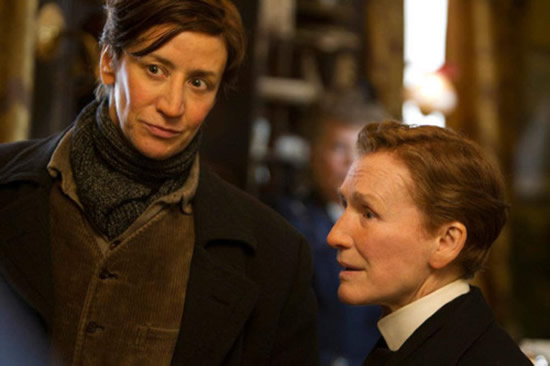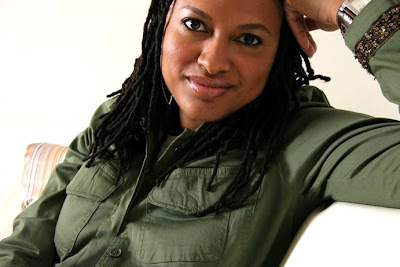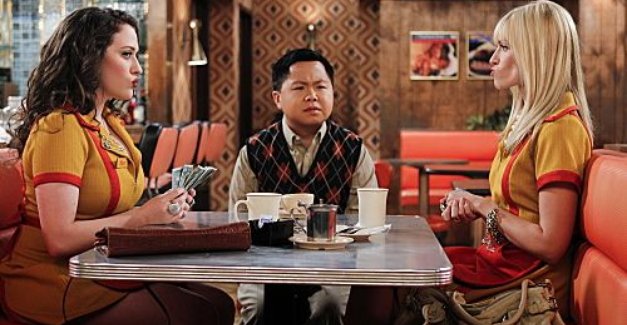 |
| Beginners (2010) |
 |
| Mélanie Laurent as Anna |
 |
| Mary Page Keller as Georgia |
 |
| Christopher Plummer as Hal |
The radical notion that women like good movies
 |
| Beginners (2010) |
 |
| Mélanie Laurent as Anna |
 |
| Mary Page Keller as Georgia |
 |
| Christopher Plummer as Hal |
 |
| The Help (2011) |
“The Help”—the film adaptation of the best-selling novel by Atlanta author Kathryn Stockett—is a feel-good movie for a cowardly [wrt to the ways we deal (or don’t deal) with issues of race] nation.
Despite its title, the film is not so much about the help—the black maids who kept many white Southern homes running before the civil rights movement gave them broader opportunities—as it is about the white women who employed and sometimes terrorized them.
Despite efforts to market the book and the film as a progressive story of triumph over racial injustice, The Help distorts, ignores, and trivializes the experiences of black domestic workers.
 |
| The 43rd NAACP Image Awards air Friday, February 17th |
In the midst of awards season, it’s easy to become overwhelmed with which awards are happening and when, and it’s easy to start thinking that the same movies/shows/actors/directors are being nominated for all the awards (for example, there are striking similarities between this year’s Academy and Independent Spirit Award major category nominees).
the outstanding achievements and performances of people of color in the arts (television, recording, literature, motion picture and writing & directing), as well as those individuals or groups who promote social justice through their creative endeavors.
Because of course when you’re a girl in a generic or male-driven mainstream genre film, even when it’s a PG-rated adventure aimed at younger kids, the only marketable attributes you have is your ‘fuck-ability’. Stay classy, Warner.
Luckily, Season 2 will see an influx of new characters, including lots of female roles. Huzzah! The “Red Priestess” Melisandre of Asshai (Carice van Houten), female warrior (!!!!) Brienne of Tarth (Gwendoline Christie), noblewoman Lady Margaery Tyrell (Natalie Dormer), Ygritte (Rose Leslie), the Ironborn captain (double !!!!) Yara Greyjoy (Gemma Whelan) named “Asha” in the novels. Wait, a sorceress, warrior and ship captain?? More women in leadership roles?? Sounds promising!
“Three great men: a king, a priest and a rich man. Between them stands a common sell sword. Each great man bids the sell sword kills the other two. Who lives? Who dies? Power resides where men believe it resides. It’s a trick, a shadow on the wall. A very small man can cast a very large shadow.”
“I am Daenerys Stormborn and I will take what is mine with fire and blood.”
“Anyone can be killed.”
“Throughout the first season…women are raped, beaten, burned and trafficked. I suppose you could chalk it up to the barbarism of medieval times. And I’m sure many will claim that as the show’s defense…or that the men face just as brutal and severe a life. I also recognize that there’s a difference between displaying sexism because it’s the time period and condoning said sexism.
“But this IS a fantasy, not history, meaning the writers can imagine any world they wish to create. So why imagine a misogynistic one?”
“I want to read more fantasy. Really, I do. But I’m unable to read it when women are constantly oppressed and seen as lesser beings in a world based on fantasy. Writers, you can create a world with any rules you choose. Yet, you continue to write sexist worlds to have your characters overcome the sexism. Can a girl fight monsters without having to deal with sexism? Does every girl have to disguise herself as a boy to fight in a war? This has nothing to do with cultural or social constructs. In your world, you don’t have to have those.”
Game of Thrones Season 2 airs Sunday, April 1st at 9pm, EST on HBO.
 |
| Mia Wasikowska and Glenn Close in ‘Albert Nobbs’ |
Haunting and sad, Albert Nobbs tells the tale of a woman who disguises herself as a man in order to survive in 19th Century Ireland. A “labor of love” and a “dream fulfilled,” Oscar nominee Glenn Close, who co-wrote the screenplay, tried to get Albert Nobbs made into a film for 30 years. Adapted from the play, which Close starred in on Broadway in 1982, is itself adapted from George Moore’s short story. Moore’s books were controversial “because of his willingness to tackle such issues as prostitution, extramarital sex and lesbianism.” Rodrigo Garcia’s poignant film Nine Lives, which Close also appeared in, showcasing 9 vignettes of women’s lives, is one of my favorite films. So my expectations were high for Albert Nobbs.
Was this a “jaw-dropping performance” by Glenn Close? She was absolutely outstanding. I didn’t realize at first just how good of a job she did until I realized I completely forgot that it was Glenn Close! I’m used to seeing her play strong, confident or assertive women. Here, Close plays a character shy, awkward, guarded and desperately lonely. She melts into the role. She’s as straight-laced and tightly wound as the prim and proper world around her.
“Albert was particularly tricky because there’s always the question of how much should show on her face because a lot of it is somebody who’s totally shut down, who doesn’t even look people in the eye. Servants weren’t supposed to look people in the eye, but she’s an invisible person in an invisible job. And then her whole evolution is slowly being able to look up – the first time she really looks someone in the face is after she’s told Hubert her story and then she kind of looks out to her dream.”
 |
| Janet McTeer and Glenn Close |
“I tried to be, on the one hand, very male, by which I mean large and expansive and confident and sitting on the back of the heels, as it were, and on the other hand I wanted [my character] Hubert to have as many as what we consider to be the loveliest of the female qualities — empathy, compassion, kindness. I wanted Hubert to be a really good mixture of both.”
After Albert meets Hubert, she realizes she could have a life of companionship. SPOILER -> Hubert is married to a woman she adores and a beautiful scene between the two portray a tender, loving and devoted couple. <- END SPOILER Hubert gives Albert hope for a different future: a life free from the shackles and confines of loneliness. In a bittersweet scene, Hubert and Albert walk along the beach together. Albert in a dress, the first she’s worn in 30 years, runs along the beach. Reminded of her old identity, in a rare expression of emotion, she’s unconstricted, buoyed by freedom and sheer joy.
Many movies contain cross-dressing plotlines for comedic effect. But not a lot exist that focus on gender-bending from a dramatic angle. Boys Don’t Cry and Transamerica explore the lives of a trans man and woman while Yentl and The Ballad of Little Jo both echo Albert Nobbs as they feature women who choose to live as men in order to survive or pursue their dreams. An act of violence as a young girl catalyzes Albert to live as a man to protect herself and survive.
Critics have focused on the gender components. But class, an equally important theme, threads throughout the entire film. Albert Nobbs depicts how women contended with and endured poverty. We witness the stark dichotomy between the lavishly wealthy clients and the servile wait staff in the hotel. Servants in the Victorian Era were to be invisible, never looking the upper class in the eye. With her downcast eyes, Albert remains dutiful. Yet she begins to aspire for more. Albert has been saving her money all her life and hopes to open a shop of her own.
The film portrays relationships and courtship as an economic contract. When Albert courts the coquettish Helen (Wasikowska), Helen expects and asks for all sorts of gifts and trinkets. SPOILER -> We also see class play out after Helen gets pregnant. Women needed men in order to survive financially. Women who give birth to children out of wedlock were punished fiscally, fired from their jobs. Husbands provided fiscal security. <- END SPOILER Gender and class coalesce. You realize Helen’s gender and station in life condemn her situation. Albert and Hubert would never be able to attain their dreams (and Hubert her independence) had they retained their identity as women.
I perpetually worry audiences watch period films with dangerously confining gender roles and then sit back thinking, “Phew, we’ve come so far!” Yeah, no, we so haven’t. Albert Nobbs raises so many thought-provoking questions. Why is the male gender the more “desirable” gender in society? What does it say about a society where half its population has a mere two options for their lives? How can women take charge of their own lives amidst confining gender norms? But therein lies my problem with the film. It provides no conclusions, the answers remain elusive.
The tragic story of Albert Nobbs lingered in my memory long after I left the theatre. Its exploration of female friendship, lesbian love, class and poverty, gender roles and a woman’s self-discovery, truly make it a rare gem.
Beth, a major in the U. S. Army Reserve, was sexually assaulted by a noncommissioned officer during a scud missile attack during Operation Iraqi Freedom. She followed reporting procedures, including undergoing the collection of evidence during another scud missile attack. Emergency contraception (EC) was “simply handed to me as a lot of pills to take. I went on birth control pills in the event that this happened to me again.”
Soraya Chemaly writes feminist satire. She is a regular contributor to The Good Men Project and The Huffington Post (where this piece originally appeared). She is also the creator of the retired blogs: Poog, a Goop Spoof and The Guide to Manic Moms.
 |
| Viola Davis and the cast of ‘The Help’ at the 2012 SAG Awards |
When Christopher Plummer won Outstanding Male in a Supporting Role for his performance as a gay man coming out to his son in Beginners, he began his acceptance speech by saying he’s “had such fun in the world’s 2nd oldest profession.” Ah, a sex work joke. Then Plummer called the film’s female producers “girls.” Oh Christopher Plummer. Yeah, calling female producers “girls,” even if they are way younger than you, not cool. But he almost redeemed himself when he again thanked his wife of 43 years who “came to his rescue and saved his life.” Swoon!
Dick Van Dyke presented icon Mary Tyler Moore with a Lifetime Achievement Award. I’ll start with what I liked. I LOOOVE that Van Dyke mentioned that Mary Tyler Moore is an animal rights advocate!!! The vegan in me cheered with delight. Ah, but the feminist in me shook my head at this:
“She’s one of the few performers, women, who can do a flat out comedy scene, slapstick and still be beautiful, feminine and adorable.”
Now, I realize he’s old and comes from another era. Don’t care. When discussing someone’s work or talent, male or female, their looks shouldn’t be mentioned. Society focuses too much on women’s appearances. People often assume women can only embody one quality: smart or sexy, funny or beautiful. As if a talented woman isn’t a success unless she’s pretty and feminine too.
When Octavia Spencer won Outstanding Female in a Supporting Role for The Help, she honored civil rights activist Medgar Evers in her poignant acceptance speech. She also said,
“Thank you for putting me in a category with so many beautiful women…It was really a privilege to work on a film that gave a voice to so many women…By honoring me, you honor them…
“I want to thank all the people out there who went to support this movie and, after watching it, felt something. You felt compelled to make a change in your lives. So I’m going to dedicate this to the downtrodden, the underserved, the underprivileged, the overtaxed, whether emotionally, physically or financially.”
Other great moments included winner Alec Baldwin giving a shout-out to Tina Fey for her witty writing on 30 Rock (damn straight) and winner Betty White thanking her 3 female co-stars, Valerie Bertinelli, Jane Leeves and Wendie Malick, on Hot in Cleveland. Loving the female camaraderie!
And speaking of female camaraderie…love, love, LOVE Maya Rudolph, Kristen Wiig and Melissa McCarthy as presenters!!! The comical trio sauntered on stage to present the clip of Bridesmaids, one of my favorite 2011 films, nominated for Outstanding Ensemble. In describing the film, Maya Rudolph said,
“Our cast tells the story of strong female friendships.”
“Do you think Scorsese saw Bridesmaids??”
When presenters Tina Fey and John Krazinski discussed advice given to actors, Fey hilariously said,
“And I believe it was the TODAY show’s fourth hour co-host Kathie Lee Gifford who said, ‘If drag queens love you, you’ll have the longest career in the world. They know phony and they know real.’”
When Viola Davis won Outstanding Female Actor in a Lead Role, the audience gave her a standing ovation. Davis is a phenomenal actor who makes the most of any role she plays. Whether on-screen for hours (The Help) or mere moments (Doubt), her quiet strength mesmerizes and enthralls. Christ she almost made Nights in Rodanthe watchable (almost). Davis shared how she decided to become an actress at 8 years old. Cicely Tyson inspired her, and she was thrilled she could see her idol sitting in the audience as she won her award. Davis said,
“What is there but a dream? You can’t trade in your dream for another dream…Dream big and dream fierce.”
Bolstered by a female ensemble, The Help was the big winner of the evening. Not only did it win the two female acting awards. And I have to say that I’m ecstatic two unbelievably talented African-American women won. But it also won Outstanding Performance by a Cast. At first, I was pissed Bridesmaids didn’t win. Then I was even more pissed that The Help won; a film touted as showcasing black women’s experiences but actually revolving around a white woman “saving” black women. But then I let Davis’ eloquent and inspiring words wash over me.
After calling working on The Help “a labor of love,” Davis articulated:
“The stain of racism and sexism is not just for people of color or women. It’s all of our burden. It’s all of us. I don’t care how ordinary you may feel. We all of us can inspire change. Every single one of us.”
Racism and sexism affect us all. More people must realize racism and sexism still exist, stripping people of equality. We need white allies and male allies working with people of color and women towards eradicating racial and gender discrimination. We must speak out whenever we see or hear prejudice or injustice if we ever hope to combat it. But all is not lost. We can all make a difference.
People often go to the movies for entertainment, to escape their mundane lives. But films can also inspire you to act boldly and dream big. And sometimes, awards shows can too.
 |
| Ava DuVernay, director of Middle of Nowhere |
Congratulations are in order for filmmaker Ava DuVernay, who over the weekend became the first African American woman to take home the U.S. directing award at the Sundance Film Festival.
DuVernay received the award for her second feature film, “Middle of Nowhere,” which tells the story of a young woman who struggles to maintain her identity while her husband serves an eight-year prison sentence.
 |
| Julie Dash speaking at the 2012 Sundance Film Festival |
George: You grew up in a household with this [Gullah] culture around you even though you grew up in New York City. What’s the journey from there as a child to you deciding to make the film?
Dash: Once I decided I was going to tell stories through film, and once I decided that I was not going to be a documentary filmmaker, but I was going to tell narrative stories (because I was excited about the literature of Alice Walker and Toni Morrison and all the poets of the time), I decided that I wanted to tell a story that was authentic to African American culture – authentic to the point where it was not like something you could turn on the television and see. I wanted it to be more like a foreign film and so deeply into the culture that it appeared to be foreign.
 |
| (L-R): Kat Dennings, Matthew Moy, Beth Behrs; ‘2 Broke Girls’ still frame |
“Keeping CBS’s promises that the future would see 2 Broke Girls creator Michael Patrick King attempt to “dimensionalize” some of its racist stereotypes—this despite King being gay, which means he doesn’t have to—the show recently put out a casting call for a “hot Asian guy” to come and romance Beth Behrs’ character with some of his hot Asianness. The arrival of this hot Asian guy would provide a much-needed balance to the comedy’s Korean caricature Han, demonstrating that there are many colors in the Asian rainbow: hot, hilariously indecipherable, unable to drive, etc. Of course, the blog that first picked up the casting call, Angry Asian Man, argues that showing that Asians can also be hot and worthy of making out with Beth Behrs doesn’t exactly make up for 2 Broke Girls’ egregious, simplistic Asian stereotyping. But then, he’s probably just upset that he’s an angry Asian man instead of one of those hot ones.”